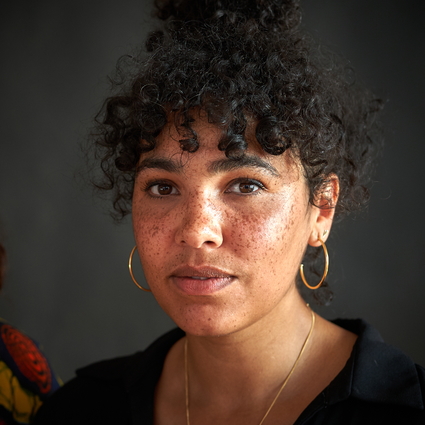How has living in Amsterdam/the Netherlands, and cooking your version of Caribbean cuisine influenced or enhanced your understanding of your own identity?
Coming to Amsterdam, I didn’t realise how spoiled I was in London-- in terms of the exposure to so many different ethnicities, and how diverse it is. And when I came to Amsterdam, I realised that it wasn’t the same. I was already starting to do popups in London around Caribbean food, modernizing it, and creating something that was going to be a more accessible platform for a larger group of people. But when I came here, it became even more important for me to do that; it became more of a legacy to create something where people would have a conversation about what Caribbean food is. And not just Caribbean food, because actually there is a wider conversation here about how we perceive other people’s cultural foods. And how it can connect people. For me, food is a way of connecting people despite their differences. So you can sit around the table with people of any religion, of any ethnicity, and it just doesn’t matter. It transpires all of those differences.
What makes you feel most connected to your own culinary history and culture, and how you actually establish your own identity in cooking Caribbean food your own way?
For me, cooking Caribbean food is an extension of home. It was like, “yeah, I don’t have my big family who I love, and the familial gatherings, which make me feel so connected. So this is a way of me having my home comforts in a foreign country”.
Is there a particular dish that helps you tap into that feeling of home? Or is it the act of cooking with certain spices, certain ingredients?
I really love oxtail with rice and peas, but I’m mostly not serving these kind of traditional dishes myself. A part of me definitely wants to make these things, because I sometimes feel that people think I can't do it, and it makes me think, “oh I just want to cook traditional things for you to see that I do have the repertoire to be able to cook that stuff.” But I’m choosing not to. I deliberately cook in a more modernized or different way.
Do you ever struggle with folks treating you like a monolith? Or the opposite? As you express your own identity through cooking.
Not a monolith, but I think there’s definitely been questioning about the kind of food I’m serving; whether or not it’s a complete bastardization, and if I’m even allowed to refer to it as Caribbean. One time in London, there was even a guy who said: “Is she even from the islands?” So I think there’s definitely a question of am I, and should I be allowed to be serving this. And I suppose from a mixed race point of view as well.
Food for thought
Lelani’s last point brings this conversation full circle-- connecting cultures, and people. Highlighting the fact that so many people feel that they themselves are the gatekeepers of authenticity, and the notion that she can’t cook Caribbean food in general because she’s not directly from the islands. It begs the question: how are we supposed to be having these bigger conversations? As a mixed race chef, the fact that she is resilient enough to bring her version of Caribbean cooking to Europe through the expression of her personal identity, creates a bigger platform for more people to engage with Caribbean cuisine. With more people taking seats at the table for this conversation, we can only understand more how to keep connecting to people from different walks of life.
In addition to the dinner series, Lelani will be hosting a workshop under the same name. On the webpage you can find more information and tickets.
